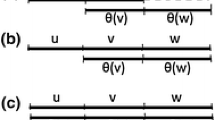Abstract
The set of all sequences that are generated by a biomolecular protocol forms a language over the four letter alphabet Δ={A,G,C,T}. This alphabet is associated with a natural involution mapping θ, A↦ T and G↦ C which is an antimorphism of Δ*. In order to avoid undesirable Watson-Crick bonds between the words (undesirable hybridization), the language has to satisfy certain coding properties. In this paper we build upon the study initiated in [11] and give necessary and sufficient conditions for a finite set of “good” code words to generate (through concatenation) an infinite set of “good” code words with the same properties. General methods for obtaining sets of “good” code words are described. Also we define properties of a splicing system such that the language generated by the system preserves the desired properties of code words.
Access this chapter
Tax calculation will be finalised at checkout
Purchases are for personal use only
Preview
Unable to display preview. Download preview PDF.
Similar content being viewed by others
References
Baum, E.B.: DNA Sequences useful for computation unpublished article (1996), available at http://www.neci.nj.nec.com/homepages/eric/seq.ps
Braich, R.S., Chelyapov, N., Johnson, C., Rothemund, P.W.K., Adleman, L.: Solution of a 20-variable 3-SAT problem on a DNA computer. Science 296, 499–502 (2002)
Berstel, J., Perrin, D.: Theory of codes. Academis Press, Inc., Orlando (1985)
Deaton, R., Chen, J., Bi, H., Garzon, M., Rubin, H., Wood, D.F.: A PCR-based protocol for in vitro selection of non-crosshybridizing oligonucleotides. In: Hagiya, M., Ohuchi, A. (eds.) DNA 2002. LNCS, vol. 2568, pp. 196–204. Springer, Heidelberg (2003)
Deaton, R., et al.: A DNA based implementation of an evolutionary search for good encodings for DNA computation. In: Proc. IEEE Conference on Evolutionary Computation ICEC 1997, pp. 267–271 (1997)
Faulhammer, D., Cukras, A.R., Lipton, R.J., Landweber, L.F.: Molecular Computation: RNA solutions to chess problems. Proceedings of the National Academy of Sciences, USA 97(4), 1385–1389 (2000)
Feldkamp, U., Saghafi, S., Rauhe, H.: DNASequenceGenerator - A program for the construction of DNA sequences. In: Jonoska, N., Seeman, N.C. (eds.) DNA 2001. LNCS, vol. 2340, pp. 23–32. Springer, Heidelberg (2002)
Garzon, M., Deaton, R., Reanult, D.: Virtual test tubes: a new methodology for computing. In: Proc. 7th. Int. Symposium on String Processing and Information retrieval, A Corun̆a, Spain, pp. 116–121. IEEE Computing Society Press, Los Alamitos (2000)
Head, T.: Formal language theory and DNA: an analysis of the generative capacity of specific recombinant behaviors. Bull. Math. Biology 49, 737–759 (1987)
Head, T., Paun, G., Pixton, D.: Language theory and molecular genetics. In: Rozenberg, G., Salomaa, A. (eds.) Handbook of formal languages, vol. II, pp. 295–358. Springer, Heidelberg (1997)
Hussini, S., Kari, L., Konstantinidis, S.: Coding properties of DNA languages. In: Jonoska, N., Seeman, N.C. (eds.) DNA 2001. LNCS, vol. 2340, pp. 57–69. Springer, Heidelberg (2002)
Jonoska, N., Kephart, D., Mahalingam, K.: Generating DNA code words Congressus. Numernatium 156, 99–110 (2002)
Kari, L., Konstantinidis, S., Losseva, E., Wozniak, G.: Sticky-free and overhang-free DNA languages (preprint)
Li, Z.: Construct DNA code words using backtrack algorithm (preprint)
Liu, Q., et al.: DNA computing on surfaces. Nature 403, 175–179 (2000)
Marathe, A., Condon, A.E., Corn, R.M.: On combinatorial word design. In: Preliminary Preproceedings of the 5th International Meeting on DNA Based Computers, Boston, pp. 75–88 (1999)
Paun, G., Rozenberg, G., Salomaa, A.: DNA Computing, new computing paradigms. Springer, Heidelberg (1998)
Ruben, J., Freeland, S.J., Landweber, L.F.: PUNCH: An evolutionary algorithm for optimizing bit set selection. In: Jonoska, N., Seeman, N.C. (eds.) DNA 2001. LNCS, vol. 2340, pp. 150–160. Springer, Heidelberg (2002)
Seeman, N.C.: De Novo design of sequences for nucleic acid structural engineering. J. of Biomolecular Structure & Dynamics 8(3), 573–581 (1990)
Author information
Authors and Affiliations
Editor information
Editors and Affiliations
Rights and permissions
Copyright information
© 2004 Springer-Verlag Berlin Heidelberg
About this paper
Cite this paper
Jonoska, N., Mahalingam, K. (2004). Languages of DNA Based Code Words. In: Chen, J., Reif, J. (eds) DNA Computing. DNA 2003. Lecture Notes in Computer Science, vol 2943. Springer, Berlin, Heidelberg. https://doi.org/10.1007/978-3-540-24628-2_8
Download citation
DOI: https://doi.org/10.1007/978-3-540-24628-2_8
Publisher Name: Springer, Berlin, Heidelberg
Print ISBN: 978-3-540-20930-0
Online ISBN: 978-3-540-24628-2
eBook Packages: Springer Book Archive




